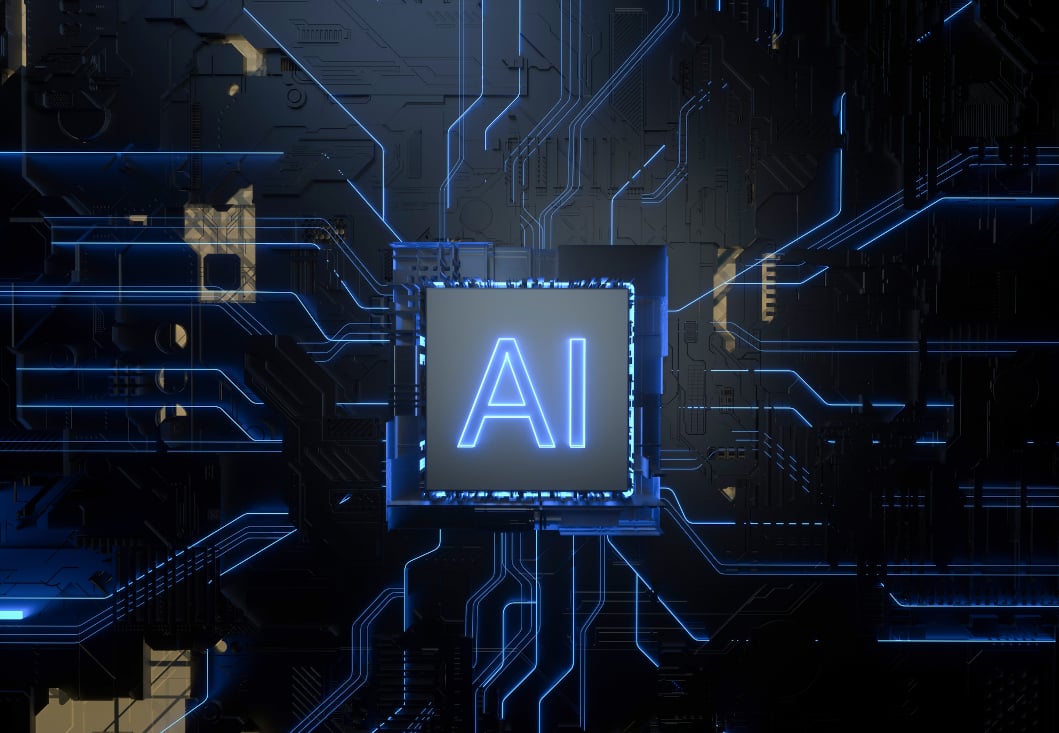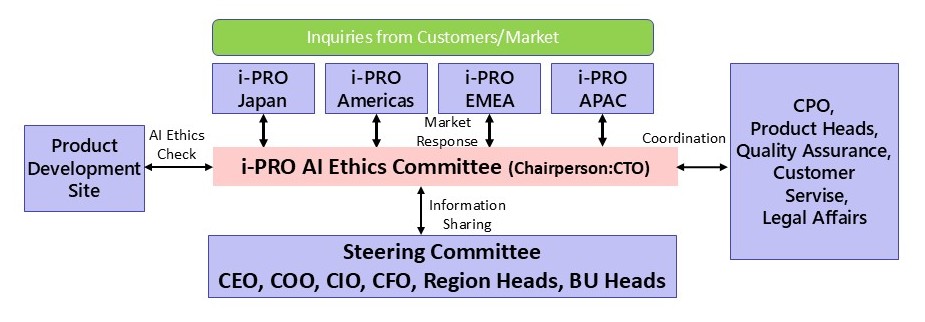

i-PRO Leads Industry in Ensuring Responsible AI Development and Compliance
In recent years, commercial use of Artificial Intelligence (AI) has evolved exponentially. The video security industry has been no exception, with AI capabilities implemented in cameras, servers and software applications.
The rapid introduction of AI has been driven by the need to gather insights from video images to take a more proactive approach based on informed decision-making, from a forensic perspective or to avert incidents.
i-PRO has been conducting AI research and development for many years. As an industry leader in edge computer AI technology, we have onboard-AI capabilities in most of our security camera lineup, to offer state-of-the-art technology to our partners and customers. Furthermore, i-PRO is prepared for future market and customer needs, and is striving to expand the latest AI technology in the security field to public safety, medical, industrial, and other business domains.
With the rapid spread of AI products and services, there has been a worldwide call for responsible use of AI. An international standard for AI management systems, ISO/IEC 42001, was published in December 2023, and the EU Artificial Intelligence Act, a comprehensive regulation for AI, was approved in May 2024.
In order to support our customers and society, i-PRO is going one step further, striving to be the first camera manufacturer to implement AI in an ethical and responsible way across our entire product lineup. Accordingly, in December 2023, we established the 'i-PRO Ethical Principles for AI,' and in September 2024, we launched the 'i-PRO AI Ethics Committee.' We have been continuously working on building and properly managing an AI governance framework, and in May 2025, we became the first company in the security industry to obtain certification for ISO/IEC 42001.
Since our early days, i-PRO has been fully committed to bringing the latest technologies to the market, to contribute to society and help create a safer world. The new era of AI is no exception, and i-PRO will uphold its proactive approach, innovating with integrity as your Trusted Next Generation Partner.
Gerard Figols
Chief Operating Officer
Our Approach to AI
i-PRO seeks to realize a sustainable society that is safe and secure, through the research, development, application, and use of AI. In recent years, the world has seen a succession of deplorable crimes and devastating disasters that have highlighted the global need for enhanced safety and security. i-PRO has long been engaged in research and development of AI. Using image recognition technology and image quality control technology, we are striving to advance recognition technology beyond the five senses, and to continually create new value.
As AI products and sensing solutions become more widespread, the ethics of AI, such as the invasion of privacy and safety concerns caused by the misuse of AI, have become social issues. In response, i-PRO places great importance on demonstrating our stance on the responsible use of AI. Consequently, we have formulated and comply with Ethical Principles for AI, and supply AI products and services that can be trusted by our customers.
i-PRO Ethical Principles for AI
Scope of Application
These Principles establish guidelines for all i-PRO employees when engaged in the use, research and development of AI. Use of AI by i-PRO refers to the provision of products and services that use AI or the use of AI in operations such as research and development, manufacturing, and providing services. i-PRO has established the following Principles to balance the advancement of AI technology with social responsibility and to uphold ethical and social considerations.
1. Realizing a better life and society that are safer and more secure
Our vision is to become a company that continues to create new value contributing to the safety and security of society through AI research and development, and by providing products and services. Even after delivery, we continue to evaluate their impact on lifestyles, society, and the environment, and to reflect the results of these evaluations in our products and services.
2. Human dignity
When using AI, i-PRO places the greatest importance on respecting fundamental, inalienable human rights. AI is based on the premise that people are central, and that AI should be used, developed, and deployed to expand human capabilities and to promote the pursuit of happiness. i-PRO aims to use AI to protect human dignity under any circumstance, to retain the trust of our customers, and to realize a safe and secure society.
3. Respecting transparency and fairness
i-PRO respects the diversity of people when providing AI products and services and strives to eliminate discrimination and unfair influences. We treat the attributes and backgrounds of individuals, such as gender, race, and religion, with equality. When using AI, we consider social justice issues seriously, maintaining transparency regarding AI operations, and provide appropriate information to our customers.
4. Protection of privacy
i-PRO respects the privacy of our customers and appropriately manages personal information according to the law and company regulations. This also applies when using AI to strengthen security measures to protect privacy and gain the trust of our customers.
5. Correct understanding of AI and training human resources
As a provider of AI products and services, i-PRO focuses on training that includes ethical considerations in AI. It also seeks to cultivate a proper understanding of AI within society, and to develop an appropriate relationship between AI and society. We consider the impacts of advances in AI technology on society from the perspectives of the provider, operator, and customer, and strive to train human resources to realize a safe and secure society and to build a brighter future.
6. Cooperation with stakeholders
i-PRO seeks to realize a safe and secure society, and to advance the use of AI. We strive to generate future value and resolve social issues by collaborating with our stakeholders, including our customers and partners. In addition, we focus on solving problems arising from the use of AI, collaborating with various stakeholders, and establishing systems whereby opinions can be shared between members through dialog, and apply the results in research and development.
7. Provision of safe products and services
i-PRO prioritizes the safety of AI products and services, uses human resources with expertise in AI, establishes systems to continuously verify, monitor, and evaluate safety, reliability, and security, and implements risk analysis.
These Ethical Principles for AI shall be revised according to developments in AI technology and social changes.
1st edition: 2023/12/15
The i-PRO AI Ethics Committee
1) Purpose
To discuss and make recommendations regarding ethical issues and risks in the development and utilization of AI in order to realize the i-PRO Ethical Principles for AI.
2) Role
① Development and maintenance of AI ethics guidelines
② Building and operational support of the AI ethics check process
③ Identification of AI risks, investigation, and recommendation of countermeasures
④ Planning and implementation of in-house education on AI ethics
3) AI Ethics Check Process
i-PRO Obtained ISO/IEC 42001 Certification
i-PRO obtained ISO/IEC 42001 certification for its Artificial Intelligence (AI) management systems on May 10, 2025.
ISO/IEC 42001 is the first international standard for management systems for the design, development, and operation of ethical, transparent, secure, and accountable AI systems by organizations utilizing AI technology. The standard was published by the International Organization for Standardization (ISO) and the International Electrotechnical Commission (IEC) in December 2023. Businesses that obtain certification are required to implement comprehensive AI management, including management systems, risk assessment, internal controls, ethics policies, human resource training, and information sharing with external parties, encompassing the entire lifecycle of AI systems.

